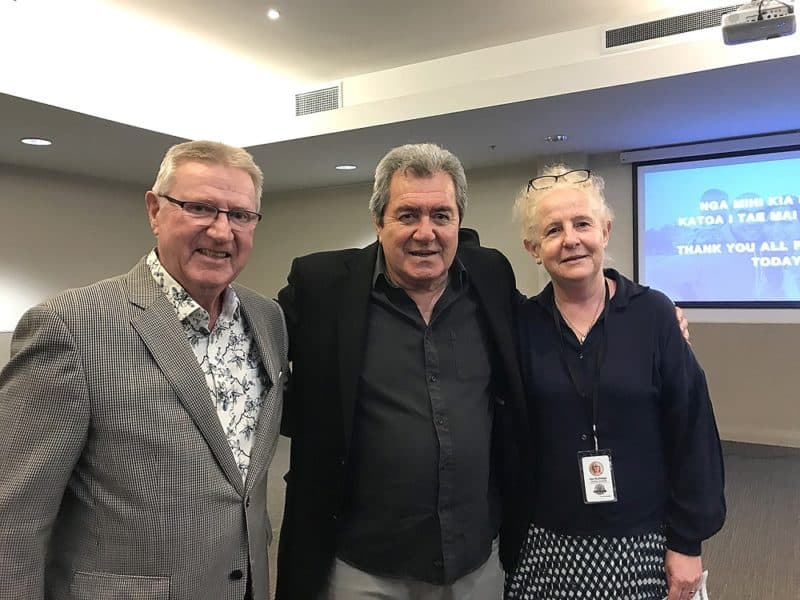New Zealand novelist, newspaper columnist and Duffy Books in Homes founder Alan Duff has said that education, and not the welfare system, is still the key to getting out of poverty.
Mr Duff spoke at a breakfast fundraiser for De Paul House, a transitional housing and social housing provider, based in Northcote, Auckland. The fundraiser was held on October 17 at The Spencer Hotel in Takapuna.
“One of the things about Jan [Rutledge, De Paul House manager] and her team’s programme is the fact that the onus of responsibility and obligations are placed on the residents. And I like that,” he said.
He said that housing the homeless is a “pretty good idea”, but added that there is a need to look into the causes of why they are homeless in the first place.
Mr Duff said that the current welfare system “rewards failure”. He said that the Government’s experiment using Rotorua motels as emergency housing is an “absolute disgrace”.
“They (homeless people) should not be spoiled like this, or if they are, they should be booted out if they don’t meet a certain set of obligations,” he said.
Mr Duff said that too many of them are Maori or Pasifika, but “this assumption that we are, somehow, more in need of help than others is just silly”.
He said that Maori should drop this “mantra of colonialism”, as “it’s a losing mindset and it’s going to lead us to disaster”.
Mr Duff said that the objective of Books in Homes is to give children a view of the wider world, and make them see that they have options.
“Last year, I was at an event. One of the lead singers of Sole Mio came out to me and he was in tears. He said, ‘they just told me who you are. We are all recipients of Duffy books, and the characters in those books gave us the idea that we didn’t have to accept that we live in a state house. We can be who we want’,” Mr Duff related.
“That is what we’re trying to do. We’re trying to open up a bigger, wider world, full of opportunities for the 100,000 children on our programme,” he said.
Mr Duff said that Books in Homes has a weekly ceremony called “Caught Being Good”, which rewards children’s good deeds, like acts of kindness or turning out good homework, with their (children’s) choice of books.
“We just send them a relentless message that it’s cool to read and it’s cool to aspire,” he said.
Mr Duff spoke to the audience conversationally, answering their questions in lieu of reading from a prepared speech.
A number of questions thrown at him was on the issue of domestic violence. He was acknowledged as one who had brought the issue of domestic violence to the forefront of New Zealand minds.
Asked why domestic violence seems to have not abated, he again pointed to the welfare system as the reason for this.
“All those roads lead back to that we reward failure. If you reward a person for being a failure, what else are they going to be?,” he said.
He said that Maori leaders should speak out on all these issues and not be afraid of political consequences.
“We must be the only country in the world that gives a welfare income to people who commit crimes against our society. They are all on benefits. And yet we pay them. We should say, the minute you appear in court, your benefit stops,” he said.
He also observed that there seems to be a condonation of violence in the culture as part of the “macho” or tough guy image. He clarified that this is not just in the Maori or Pasifika culture, but in other cultures as well.
“I don’t want to emasculate [men] . . . nor do we want to throw away the warrior. You could be a warrior when you play sport. Then, after, you can be a gentleman with your wife or with your daughter,” he said.
Mr Duff said that, although he is not a believer, he notes that most of the young Pasifika youth who are exposed to Church are extremely courteous.
“I think there should be a strong emphasis in the schools about values,” he said. “Whatever makes us better morally, then we should be embracing that.”

I am re-reading Duffs” A conversation with my country.”I am the daughter of post WW2 immigrants from Europe to Australia then NZ. I know many people who have battled with addictions and 80% would have come from traumatised backgrounds; emotional disconnection, lack of love, addictions. I imagined that the story behind the recent shooting in Auckland would be the same.
Kia ora Alan, I have read many of your books in my life and appreciate you as a Maori author. I have an issue with the Duffy books in homes. My 6 year old son came home with a book titled “Kia hou take Tau.” ” I need a new bum”. It is deeply concerning for me as This material is far from educational worthy of any childs mind play. In an age of human trafficking being exposed and paedophilia within the system this book and those of it’s series can be viewed as grooming material for child predators. The author has an obsession with rear ends which is evidently clear.
I have written a number of emails to the author, penguin publishers and Duffy online with barely a response.
Please consider looking into what material is being offered to our lower decile communities that private schools would throw in the bin.
Nga mihi